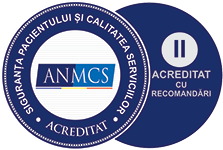Depression – the disease of our century
What is depression?
Depressive disorder is an illness that affects the body, mood and thoughts. It influences the way a person eats, alters sleep, changes the way people perceive others and the person.
Without treatment specific to the form of depression they are experiencing, people prolong their pain and suffering by weeks, months and even years.
The severity of symptoms varies over time depending on the person affected. The most common are:
- persistent sadness and anxiety;
- feelings of helplessness and pessimism;
- feelings of guilt and worthlessness;
- lack of interest and pleasure in various hobbies and activities that were once enjoyed;
- persistent physical symptoms that do not respond to treatment: headaches, digestive disorders, chronic pain, etc.
Alzheimer’s – the terrible disease of forgetfulness
Are you worried about your mom or dad who started acting strange or forgetting everything you discussed just an hour before? Memory problems can be symptoms of Alzheimer’s disease.
Alzheimer’s is a progressive, degenerative disease that causes several types of changes in the affected person’s brain. In the early stages of the disease, symptoms are not very obvious. Then the patient begins to have small memory lapses popularly called “lapses”. As the disease progresses, the patient experiences various states of confusion in performing daily rituals. Disorientation and poor judgement are the next steps in the evolution of the disease.
As with other conditions, early diagnosis plays a very important role in order for treatment to work. For this reason, it is important to recognise the symptoms and consult a doctor as soon as possible so that the affected person can benefit from treatment in the early stages of the disease. Although some changes in memory are normal as we get older, the problems that occur and affect everyday life.
Schizophrenia
Schizophrenia is defined in the Larousse psychiatric dictionary as a psychosis occurring in young adults, usually chronic, clinically characterized by signs of mental dissociation, affective discordance and incoherent delusional activity that generally result in a break in contact with the outside world and autistic withdrawal. It generally develops in adolescence. The risk of its occurrence is reduced after the age of 30 and disappears completely after the age of 45.
Drug treatment is the first line of treatment for schizophrenia. The most commonly used drugs are neuroleptics. Therapy is prescribed over a long period, sometimes for several years.
What symptoms are signs of the onset of a schizophrenic episode?
Most of the time, the prodromal period (the period preceding the onset of the psychotic state) can be observed by people around the patient. He is much more isolated than what we call an introvert, tending to isolate himself socially and interacting less and less and taking various precautions. There is a deterioration in his ability to function in everyday life and in taking on simple responsibilities, including those related to hygiene. He finds it increasingly difficult to concentrate and is unable to solve even minor problems.
He lacks the motivation or desire to take any kind of initiative or enjoyment, to show open and energetic interest in things and it is very difficult to maintain a conversation with this person, having moments of hostility or even aggression. Many of the symptoms can be mistaken for those of a major depressive episode, in which psychotic elements may also appear. Then there are the unusual perceptions that precede the hallucinations, which may or may not be shared with others, depending on their confidence and awareness of their symptoms.





 Română
Română English
English